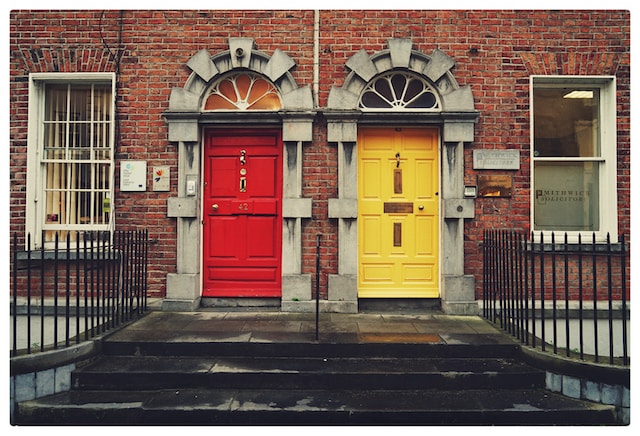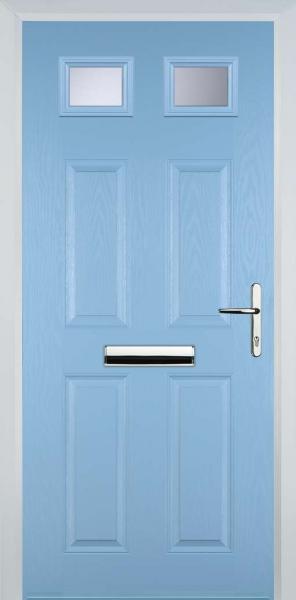Composite vs uPVC Doors
 When it comes to home improvement, few decisio
When it comes to home improvement, few decisio
Read on to discover the differences between these popular door styles and work out which variety is best for your property.

What are composite doors?
Composite doors have many benefits and are a popular choice among homeowners seeking a stylish and robust option for their homes. These doors are constructed from a combination of materials, including PVC, wood, insulating foam, and glass-reinforced plastic (GRP). This blend of materials is specifically designed to provide the best possible performance in terms of durability, security, and energy efficiency.
What are the pros of composite doors?
There are several reasons you may want to invest in composite doors, but what exactly makes them so popular?
Strength and durability
Thanks to the GRP outer layer, composite doors are highly resistant to scratches, dents, and other forms of damage. This makes them a fantastic long-term investment for homeowners seeking a door that can withstand the test of time.
Security
Composite doors are an excellent choice if you’re looking for maximum security. Their solid core construction and multi-point locking systems make these doors incredibly difficult to break into, providing peace of mind to homeowners.
Energy efficiency
As the cost of living rises, energy efficiency is a crucial consideration for many of us. And an effective choice of door can be really beneficial to maintaining heat retention in your home.
Composite doors have an insulating foam core that provides excellent thermal efficiency, helping to keep your home warm in the winter and cool in the summer. This can help lower your energy bills and create a more comfortable living environment for you and your family.
Aesthetic appeal
Well-known for their polished, attractive look, composite doors come in a wide range of designs and finishes. At Flying Doors, our online customisation tool makes it quick and easy to tailor composite doors to your desired style — whether that’s a rustic wooden look or something more modern and sleek.
Adapt the colour, window glazing, handle style, and more. Need some inspiration?

What are uPVC doors?
uPVC doors, or unplasticized polyvinyl chloride doors, are another popular option for homeowners. These doors are made from a rigid form of PVC, which is highly durable and resistant to weathering. uPVC doors have become increasingly popular over the years due to their low maintenance requirements and affordable price point.
What are the pros of uPVC doors?
uPVC doors are an excellent choice for those who are looking for a clean, low-maintenance finish. Not only are uPVC doors highly energy efficient and relatively low cost, but they are also incredibly long-lasting.
Affordability
One of the main advantages of uPVC doors is their cost-effectiveness. Generally speaking, uPVC doors are less expensive than composite doors, making them an attractive option for budget-conscious homeowners.
Low maintenance
uPVC doors require very little maintenance, only needing an occasional wipe down with a damp cloth to keep them looking their best. This makes them a great choice for busy households or those looking to minimise upkeep.
Weather resistance
uPVC doors require very little maintenance, only needing an occasional wipe down with a damp cloth to keep them looking their best. This makes them a great choice for busy households or those looking to minimise upkeep.
Easy installation
Due to their lightweight construction, uPVC door installation is typically a quick and straightforward process. This means that you should have no problems installing your doors yourself with minimal fuss.
How is a composite door made?
Composite doors are crafted from a fusion of materials, designed to offer the best features of each constituent. The core of a composite door typically consists of a solid timber frame, surrounded by high-density insulating foam. This construction ensures excellent thermal efficiency and strength.
A durable glass-reinforced plastic (GRP) skin covers the door's core, providing a robust, weather-resistant surface that resists fading, warping, and cracking. The result is a door that boasts exceptional security, insulation, and longevity, while also offering a wide range of design options.
How is a uPVC door made?
uPVC doors are made from unplasticised polyvinyl chloride, a sturdy and low-maintenance material that has become increasingly popular among homeowners. The manufacturing process of uPVC doors involves the extrusion of uPVC profiles, which are then cut and assembled to create the door's frame.
The core of a uPVC door is often hollow, with steel reinforcement added for structural integrity. Double-glazed or triple-glazed glass units are fitted within the frame, ensuring excellent thermal performance. The finished product is a low-maintenance, weather-resistant door that can be easily installed and offers an affordable solution for homeowners.
uPVC or composite: which door is best for you?
Both uPVC doors and composite doors are durable, stylish, and functional, but depending on your specific needs and aesthetics - you may be better suited to one or the other.
If you’re working with a tight budget, uPVC doors are generally more affordable, and easier to install than composite doors. This is because they are made from more lightweight plastic, and therefore much lighter to carry and fit into your wall. This makes them cheaper than their composite counterparts, which are made up of a compound of materials to achieve the desired appearance, shape, and texture.
Similarly, if you have young children or pets, uPVC doors may be a more convenient option. They are relatively low maintenance, incredibly easy to clean, and your uPVC door will be free of muddy paws, mucky fingerprints, and dusty grime in no time! Usually, they’ll only need the occasional wipe down to keep them in their optimal condition.
On the other hand, if security is a top priority for you and your family, then a composite door might be a better option for you. Built with superior strength and durability in comparison to uPVC doors, composite doors provide advanced security features such as solid construction and multi-locking systems that will give you maximum protection at all times.
When it comes to aesthetics, there really is no comparison when it comes to composite doors. Whatever your style, composite doors come in a range of styles, finishes, and textures to suit any theme, or to complete any look you hope to achieve.
uPVC doors and composite doors with Flying Doors
Whilst both uPVC doors and composite doors each have their own pros and cons, ultimately, the right door for your home will depend on your own unique requirements and priorities. Take the time to decide whether a uPVC door or composite door would be best suited for your home or project.
Choose from a wide variety of styles and finishes to find the right door for you, and with our special delivery, and 10 year guarantee - you can be rest assured that our doors won’t let you down.
Get in touch with us today on 01246 917 914 to get started.